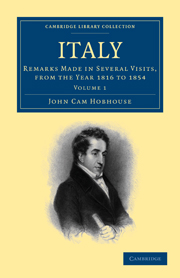Summary
FEW REMAINS OF REPUBLICAN ROME.
It was one of the complaints of Poggio that he saw almost nothing entire, and but very few remains, of the free city; and, indeed, the principal disappointment at Rome arises from finding such insignificant vestiges of the first ages and of the republic. Something, perhaps, might be added to the lists of them given by Mr. Forsyth; but not much. We have seen how soon those works disappeared; but we might still have expected to find something more than a sewer, a prison, a row of vaults, a foundation wall, a pavement, a sepulchre, a half-buried fragment of a theatre and circus. The artist may be comparatively indifferent to the date and history, and regard chiefly the architectural merit of a structure; but the Rome which the Republican Florentine regretted, and which an Englishman must wish to find, is not that of Augustus and his successors, but of those greater and better men of whose heroic actions his earliest impressions are composed.
We have heard too much of the turbulence of the Roman democracy and of the Augustan virtues. No civil tranquillity can compensate for that perpetual submission, not to laws but persons, which must be required from the subjects of the most limited monarchy. The citizens of the worst regulated republic must feel a pride and may indulge a hope superior to all the blessings of domestic peace, and of what is called established order, another word for durable servitude.
- Type
- Chapter
- Information
- ItalyRemarks Made in Several Visits, from the Year 1816 to 1854, pp. 301 - 329Publisher: Cambridge University PressPrint publication year: 2009First published in: 1859

